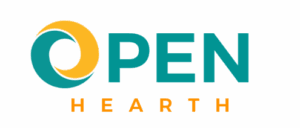|
Getting your Trinity Audio player ready...
|
Capacity Canada – Open Hearth Project Mentorship Network Launch‘
Introduction
Capacity Canada’s Open Hearth project is a 33-month initiative funded by Women and Gender Equality Canada (WAGE), running from July 2024 to March 2027. Its primary objective is to increase the presence of underrepresented women and non-binary individuals in leadership and decision-making roles within the nonprofit sector. The project’s two central components are the Mentorship Network and the Organizational Culture Change framework, both designed to foster leadership and create a supportive, equitable environment for women in the nonprofit sector. The implementation of these initiatives is underway in Waterloo Region, Ontario, and will expand to include St. John’s, Newfoundland, and Calgary, Alberta over the next 12 months. Through this strategic approach, Open Hearth seeks to empower women, promote leadership development, and contribute to a more inclusive and diverse leadership structure across nonprofit organizations in these regions.
Network Launch Event
The mentorship network officially launched with an in-person event on May 6 in Waterloo. Bringing together a cohort of 16 mentorship pairs, it served as a pivotal moment for the project; creating space for meaningful connection, collaboration, and learning among mentors, mentees, and the Capacity Canada team. Participants had the opportunity to engage in insightful discussions about mentorship, leadership and the diverse ways these concepts manifest in the non-profit sector. The keynote speaker was Dr. Junie B. Facey who had over 25 years of experience in the non-profit sector. She offered valuable insights on mentorship as a tool for driving change and leadership development. As a strategic thinker and the Associate Executive Director at Findhelp211, Dr. Facey emphasized the importance of fostering inclusive, empowering relationships within teams and across organizations.
The event also featured a distinguished panel of experts, including Sherryl Petricevic, who played a key role in the successful establishment of Women in Communications Technology (WCT) Waterloo Region Chapter Mentor Circles program, alongside Tammy Webster, Director of Equity at Let’s Talk Science, and Oluseun Olayinka, Executive Director of Adventure4Change. Each panelist shared their unique experiences with mentorship, discussing its vital role in creating leadership pathways, advocating for equity, and empowering women within the non-profit community. By fostering connections and providing space for dialogue, Open Hearth’s mentorship network launch provides the foundation for ongoing collaboration and support for women leaders in the nonprofit sector.
Keynote and Panel Discussion
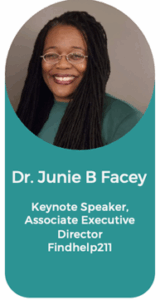 As keynote speaker of the event, Dr. Junie shared valuable insights on proactive leadership and the importance of strategic thinking in today’s increasingly complex world. She emphasized the need for leaders to act swiftly when opportunities arise, as delay can often mean missed potential. Building on her message, Dr. Junie quoted Nelson Mandela, highlighting the power of education as “the most powerful thing that can change your life.” She framed education not only as a formal process but as a lifelong tool for personal growth and empowerment. Her call for learning accountability was a powerful reminder to the audience that one must commit to their full potential, constantly striving to align their actions with their aspirations.
As keynote speaker of the event, Dr. Junie shared valuable insights on proactive leadership and the importance of strategic thinking in today’s increasingly complex world. She emphasized the need for leaders to act swiftly when opportunities arise, as delay can often mean missed potential. Building on her message, Dr. Junie quoted Nelson Mandela, highlighting the power of education as “the most powerful thing that can change your life.” She framed education not only as a formal process but as a lifelong tool for personal growth and empowerment. Her call for learning accountability was a powerful reminder to the audience that one must commit to their full potential, constantly striving to align their actions with their aspirations.
In the second half of her presentation, Dr. Junie shifted the focus to the power of high-functioning, collaborative teams. Drawing from the “Geese Story,” she illustrated how successful, engaged teams are vital to achieving organizational success, noting that strong relationships, clear communication, and mutual respect among team members are integral to high performance. Dr. Junie emphasized that a strategic mindset means balancing the big picture with attention to everyday tasks, urging leaders to focus on long-term goals while managing the details that contribute to overall success.
She concluded her talk with a powerful, introspective question: “What will people remember from their interactions with you?” Dr. Junie’s message was clear: leadership is not just about achieving measurable results; it’s about the positive, lasting impact we leave on others and the legacy we build through our interactions.
The panel discussion on mentorship and leadership in the non-profit sector brought together diverse perspectives from Tammy Webster, Sherryl Petricevic, and Oluseun Olayinka.
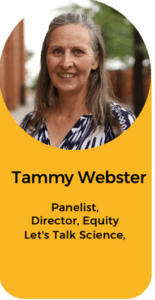 Tammy shared her leadership focus which includes developing positive and professional relationships built on acting and engaging as a critical friend to drive systemic change and bringing an urban First Nations voice to places where decisions are made that will shape the vision for future generations.
Tammy shared her leadership focus which includes developing positive and professional relationships built on acting and engaging as a critical friend to drive systemic change and bringing an urban First Nations voice to places where decisions are made that will shape the vision for future generations.
Sherryl, with her background in tech, spoke about the importance of curiosity and a desire to learn when breaking into traditionally male-dominated spaces. She highlighted that being clear about her own strengths and what she had to offer were critical ingredients to her success. 
Oluseun shared her commitment to diversity in leadership, recalling how she intentionally sought to bring together diverse perspectives to foster meaningful change at her organization. She spoke fondly of a long-time mentor who continues to support her and challenge her in making career decisions where she can have the biggest impact.
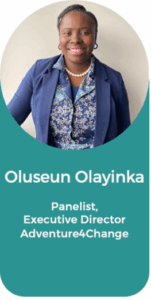 The discussion concluded with reflections on leadership. Tammy noted that “leadership is a virtue, not a position,” while Sherryl emphasized authenticity, and Oluseun highlighted the resilience needed to overcome challenges. Together, the panelists highlighted continuous learning, adaptability, and the commitment to meaningful work as important elements of a progressive leadership journey.
The discussion concluded with reflections on leadership. Tammy noted that “leadership is a virtue, not a position,” while Sherryl emphasized authenticity, and Oluseun highlighted the resilience needed to overcome challenges. Together, the panelists highlighted continuous learning, adaptability, and the commitment to meaningful work as important elements of a progressive leadership journey.
Group Activity
At the networking and launch event of the mentorship network, participants took part in a world café activity where mentors and mentees circulated around the room to answer four thought-provoking questions.
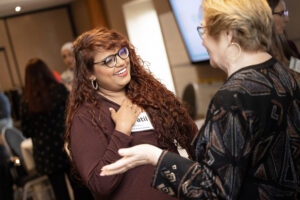 The first question asked, “What does success look like for you in this mentorship network?” Key responses emphasized the importance of having a clear purpose and well-defined goals, with success seen as achieving meaningful change in a mentee’s life. The responses highlighted the need for a safe space where mentors and mentees could ask questions freely, with authenticity, trust, and mutual respect at the core. Mentees also expressed the value of flexibility from both sides, with mentors offering true guidance and creating an environment for vulnerability and personal growth.
The first question asked, “What does success look like for you in this mentorship network?” Key responses emphasized the importance of having a clear purpose and well-defined goals, with success seen as achieving meaningful change in a mentee’s life. The responses highlighted the need for a safe space where mentors and mentees could ask questions freely, with authenticity, trust, and mutual respect at the core. Mentees also expressed the value of flexibility from both sides, with mentors offering true guidance and creating an environment for vulnerability and personal growth.
The second question focused on the qualities that a good leader needs today, with participants identifying key traits such as accountability, authenticity, empathy, integrity, and humility. Additionally, qualities like curiosity, bravery, and the ability to listen and adapt were emphasized, with many noting that being a good leader also involves being a good follower at times.
authenticity, empathy, integrity, and humility. Additionally, qualities like curiosity, bravery, and the ability to listen and adapt were emphasized, with many noting that being a good leader also involves being a good follower at times.
The third question examined systemic challenges faced by underrepresented groups in leadership, where responses pointed to issues such as lack of mentorship, barriers in recruitment, wage inequality, and insufficient representation in leadership roles. Participants stressed the importance of diversity training, equitable policies, and creating opportunities for underrepresented groups to thrive by addressing cultural and structural barriers.
Finally, when reflecting on key takeaways from the event, participants highlighted the significance of bringing personal values into leadership, trusting one’s instincts, and continually learning from others. Many spoke about the importance of setting boundaries, being assertive, and finding supportive communities. A recurring theme was the value of embracing vulnerability and failure as part of the leadership journey, with several mentees expressing newfound confidence in pursuing their goals.
Conclusion
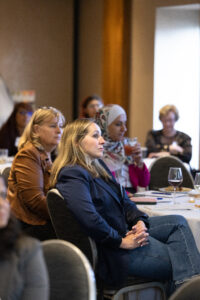 As we move forward from the successful launch of the Open Hearth mentorship network, the next steps are crucial in ensuring the continued growth and impact of the project. For mentors and mentees, the next phase will involve meeting and beginning their one-on-one mentorship journeys, with a focus on building meaningful, supportive relationships that drive both personal and professional development.
As we move forward from the successful launch of the Open Hearth mentorship network, the next steps are crucial in ensuring the continued growth and impact of the project. For mentors and mentees, the next phase will involve meeting and beginning their one-on-one mentorship journeys, with a focus on building meaningful, supportive relationships that drive both personal and professional development.
The Capacity Canada team will be working diligently to finalize the logistics for the St. John’s launch, drawing on the insights and feedback gathered during the Waterloo Region event. This will involve engaging with local mentors and mentees, identifying key leaders, and adapting the mentorship model to suit the unique needs of the St. John’s and surrounding community. The team will also begin coordinating efforts to launch the Calgary portion of the mentorship network, ensuring that all regions are aligned with the overarching goal of fostering gender equity and leadership development in the non-profit sector. With the momentum from the successful launch in Waterloo Region, Open Hearth is poised to expand its reach and continue building a strong, supportive network that empowers women in leadership across these key regions.
For more information about Open Hearth, contact our project team

